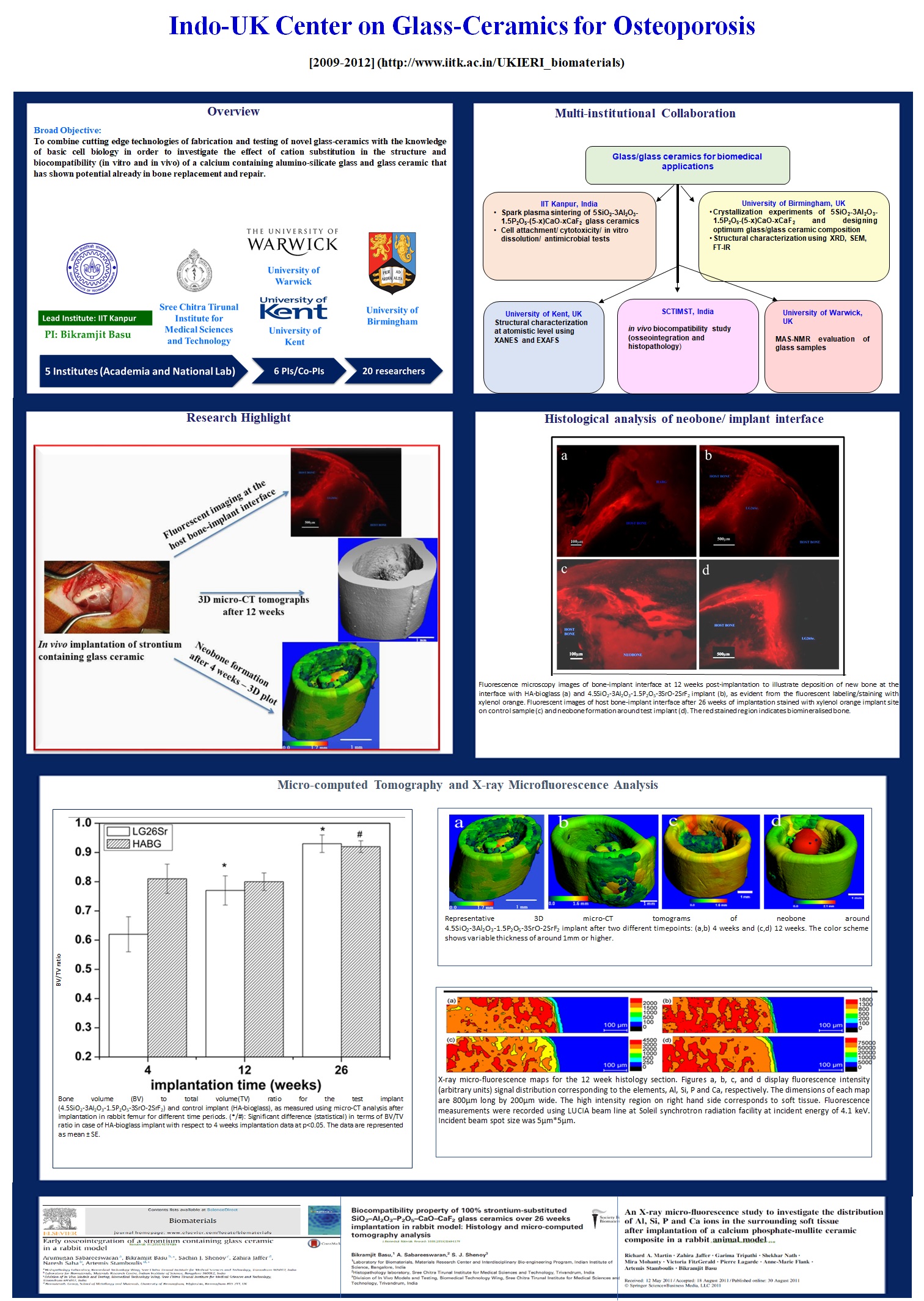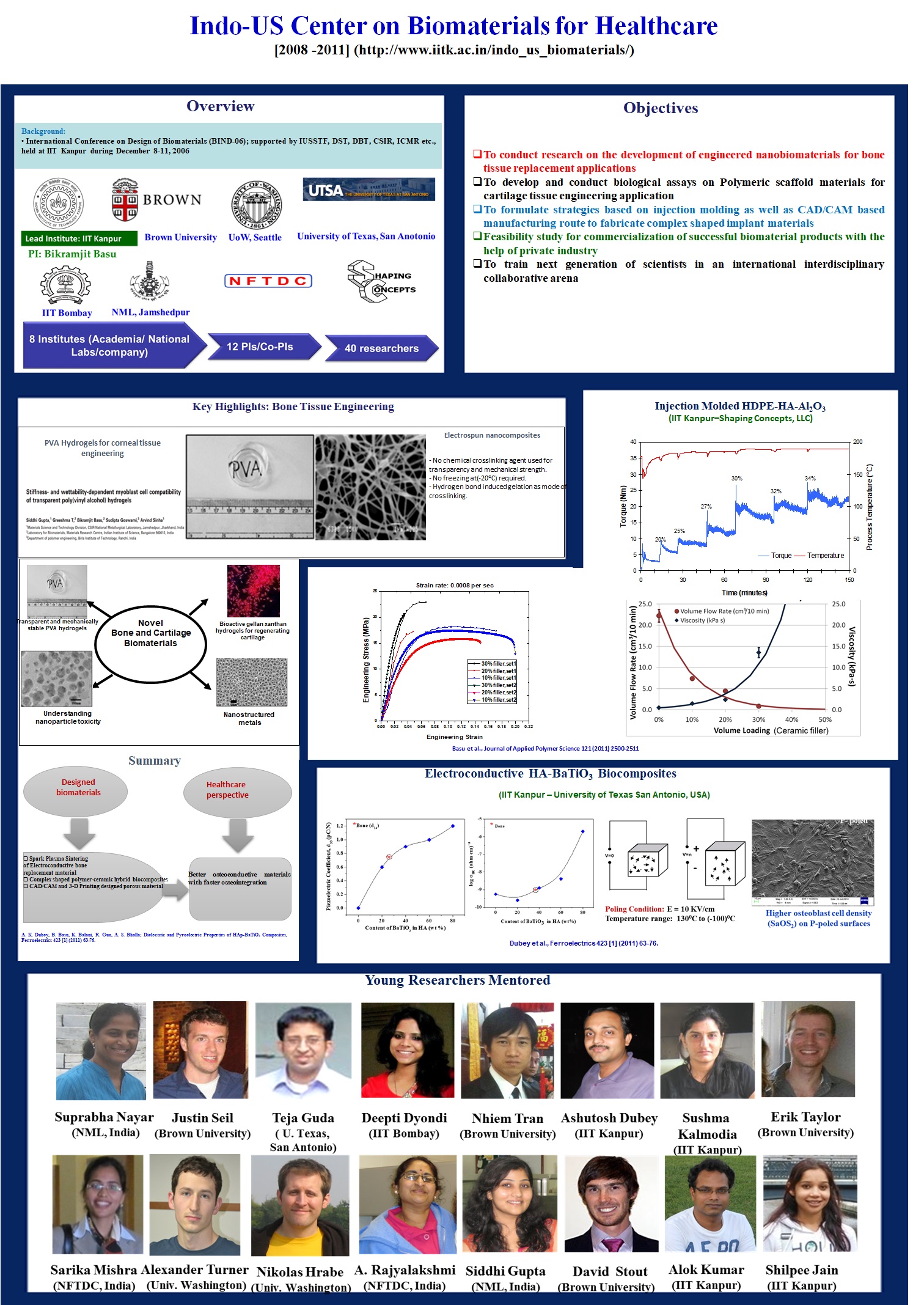Contributions to International Research Ecosystem and Education:
Over the last two decades, Bikramjit led several international research programs with universities in USA, UK, Turkey, Slovenia and BRICS countries. He has collaborated and hosted international colleagues and young researchers in his research group, mostly through funded bilateral collaborative projects, including Global Challenge Programs. In promoting education and research on Ceramics and Biomaterials, Bikramjit has invested untiring efforts in organizing several international conferences in India or many workshops at major global meetings; and similarly, in teaching Masters students in multiple countries, including UK, Spain, France, Belgium and Nepal. He also contributed significantly to the American Ceramic Society, European Ceramic Society, and to editorial responsibilities in multiple journals or advising federal funding agencies, as a foreign expert.
Research Collaboration with Europe
Belgium: Bikramjit pursued his PhD from Katholieke University Leuven, Belgium during 1997-2001. During this time and following that period, he conducted collaborative research in transformation toughened ZrO2 and developed a new generation of ZrO2 composites together with VanderBiest and Vleugels during 1998 – 2004. He has published 17 peer reviewed research papers with them. He continued his interactions and VanderBiest delivered a Keynote lecture at BIND06 conference, organised by Bikramjit at IIT Kanpur, India. Bikramjit visited KU Leuven at regular intervals. He has been Res Metallica Chair at KU Leuven in 2019 and in this role, he taught masters students and had high level meetings with KU Leuven academic administration. This has resulted in signing of MoU between KU Leuven and IISc.
United Kingdom: Bikramjit led the UK-India Education and Research Initiative (UKIERI) funded research program on glass-ceramics for musculoskeletal applications where, he collaborated intensely with researchers from top UK universities, and hosted 2 research interns. Since May 2018, he was appointed as Honorary Professor at School of Materials, Univ. of Manchester for a period five of years. During 2018-2019, a PhD student from Bikramjit’s group, visited Professor Brian Derby’s group at University of Manchester as part of a synchrotron study to understand 3D printing binder-material interactions, resulting in a newer understanding on inkjet printing of biological cells, which resulted in two research publications. Under the Scheme for Promotion of Academic and Research Collaboration (SPARC) program, one of Bikramjit’s PhD students visited University of Manchester to pursue research on biomechanical and electrical stimulation of stem cells on UHMWPE-HDPE polymer hybrid nanocomposites reinforced with graphene oxides. Bikramjit and Prof. Gough recently (November 2019) organised and hosted a collaborative workshop at the University of Manchester.
Germany: Bikramjit hosted 2 research interns from U. of Applied Science, Regensburg and U. of Wurzburg. He published 6 research papers with German colleagues from U. of Wurzburg, TU Dresden and RWTH Aachen. He carried out research collaborations in 3D printing of ceramics, 3D plotting of bioceramics and nanomaterials etc.
Slovenia: Bikramjit wrote 2 books and published a few papers with Mitjan Kalin, and was Erasmus Visiting Chair to University of Ljubljana in 2018. He conducted an Indo-Slovenia research project and hosted Kalin at IIT Kanpur.
Spain: Bikramjit was Visiting Professor, under the ERASMUS Mundus Programme, to University Polytechnica Catalonia, Spain. He taught Masters Students a course on Tribology of Engineering Ceramics.
Slovakia: Bikramjit has been appointed as visiting scientist at FUNGLASS, European Centre for Functional and Surface Functionalized Glass, Trenčín, Slovakia (2020-21).
Turkey: Bikramjit carried out One project with TUBITAK (2008) and one research intern was hosted. He visited several universities and industries in Turkey, and was Overseas Scholar in 2008.
Indo-UK Bilateral Research Program on Glass Ceramics for Osteoporosis:
Specific Role: Indian Key Leader, Funding: UK-India Educational Research Initiative, UKIERI
[Consortium: IIT Kanpur, SCTIMST, Univ. of Birmingham, Univ. of York, Univ. of Warwick] (2009-11)
Clinically, osteoporosis is one of the most common health risks faced by the vast majority of ageing populations across the world, especially post-menopausal women. The occurrence of this systemic skeletal disease eventually makes the bone weak, porous and fragile. The survival of implants in such patients is very low, as osteoporosis affects the process of osseointegration, and patients otherwise have to undergo revision surgery. This unmet clinical need has driven an international program, the Indo-UK Biomaterials centre on glass ceramics for osteoporosis. Altogether, 6 co-PIs and 15 researchers took part in this interdisciplinary research consortium. The pre-clinical validation of Sr-doped glass ceramics in a rabbit animal model confirmed neobone formation, both qualitatively using histological analysis and quantitatively using micro-computed tomography. This project has led to the development of novel glass ceramic implants that have been found to be biocompatible in vivo, with regard to local effects after implantation, in addition to the training a number of young researchers from India and the UK.
Russia: Bikramjit has an ongoing funded research program with Russia under BRICS program. He also visited Institute of Inorganic Chemistry, Russian Academy of Sciences and delivered lecture. The summary of his program with Russia is provided below.
BRICS Project: Silicon Carbide based Bioceramic Coatings
Specific Role: Principal Investigator and project co-ordinator; Funding: BRICS- STI funding
[Consortium: IISc, Bangalore, Nikolaev Institute of Inorganic Chemistry, Russian Academy of Sciences, Novosibirsk; Wuhan University of Technology, Peoples Republic of China] (2018-21)
In the context of the cardiovascular treatment, a medical device or prosthesis undergoes substantial modification due to cellular complement activation, resulting from local tissue injury. While Ti6Al4V-based or NiTi-based shape memory alloys are clinically used as coronary stents, many of these materials do not have the greatest combination of blood-compatibility and cytocompatibility. Apart from antibacterial properties and cytocompatibility with endothelial cells, the blood-contacting devices should have lower hemolysis (less than 4 %), less platelet adhesion and aggregation, without causing any morphological deformation to red blood cells and extended blood coagulation time. In the BRICS project, a new generation SiCxNyOz or SiC-based coatings was developed using magnetron sputtering or laser-based CVD for cardiovascular applications. Bikramjit’s group developed an in-depth understanding of their hemocompatibility, endothelialization and antibacterial properties. These coatings demonstrated clinically acceptable hemocompatibility parameters (low state of platelet activation to inhibit thrombus formation) and better biocompatibility than uncoated Ti. This study has entered into pre-clinical validation.
Related Publications:
1. Nitu Bhaskar, Veronica Sulyaeva, Elizaveta Gatapova, Vasily Kaichev, Dmitry Rogilo, Maxim Khomyakov, Marina Kosinova, Bikramjit Basu; SiCxNyOz Coatings Enhance Endothelialization and Bactericidal activity and Reduce Blood Cell Activation. ACS Biomaterials Science & Engineering 6 [10] (2020) 5571 – 5587
Research Leadership, Bilateral Collaboration with USA:
Indo-US Joint Network Center on Biomaterials for Human Healthcare
Specific Role: Principal Investigator and project co-ordinator; Funding: Indo-US Science and Technology Forum [Consortium: IIT Kanpur, IIT Bombay and 2 National Labs from India; Brown University, University of Washington, Seattle, University of Texas, San Antonio, Shaping concept, LLC] (2008-11)
The Indo-US Public-Private Networked R&D Center on Biomaterials for Healthcare, involved 12 co-PIs and 25 Indian/US young researchers. The outcome led to the development of biomaterials for orthopedics, corneal, dermal, cartilage and cardiovascular tissue engineering applications. Notable achievements were: a) new class of bone analogue bioceramics; b) HA-based electroconductive piezobiocomposites; c) the development of polymer-based scaffold materials for cartilage tissue engineering application; d) injection molding of polymer-ceramic hybrid biocomposites; and e) CAD/CAM based manufacturing of complex shaped coupons of implantable biomaterials.
Solar Energy Research Institute for India and the United States (SERIIUS):
SERIIUS was jointly funded by DST and the U.S Department of Energy (DOE) over a 5-year period (2012-18). A large consortium, with 3 research thrusts, 20 projects, 37 tasks, 100 milestones and nearly 200 researchers, was devoted to inventing cutting-edge technologies for energy-related applications. In the Concentrated Solar Power thrust, Bikramjit’s efforts led to the development of the spectrally-selective novel ceramic absorber coatings for efficient renewable energy utilisation. In addition to excellent thermal stability at 500°C for 150 hours in air, the accelerated thermal shock testing (30 cycles at 450°C) on those coatings in simulated solar field environment at Sandia National Laboratory indicate reliable service durability of more than 20 years.

